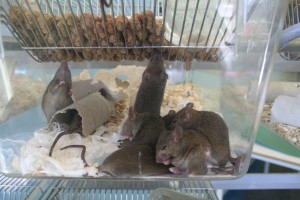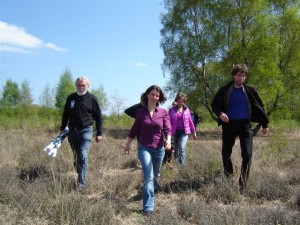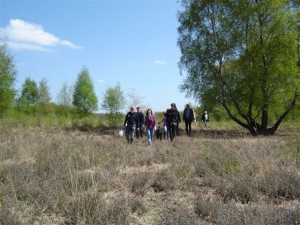Worldlog Semena 21 – 2013
Que Maravilha, conseguimos comprar no leilão quase 100 mil metros quadrados da natureza vulneráveis da Secretaria Florestal Em 2,5 semana, conseguimos arrecadar um quarto de milhão com as chamadas em mídias sociais, spots de rádio e apoio do programa de rádio Vroege Vogels e dos nossos próprios membros. Conseguimos assim, proteger a natural vulneráveis do mercado. Para nosso conhecimento, esta é a maior iniciativa dos cidadãos em matéria de compra da natureza. Maiores informações sobre a natureza e nossa ação no leilão pode ser encontrada no Worldlogs nas últimas duas semanas.
Estou muito contente que tantos ambientalistas se uniram por trás dessa ação positiva para salvar partes vulneráveis da natureza. O fato de que nós coletamos uma quantidade tão grande em tão pouco tempo indica que a maioria das pessoas foram tocadas nesta destruição da natureza. O Partido para os Animais irá aliás – dentro e fora do Parlamento – continuar a opor-se à posterior venda da natureza. Um governo indicando o preço do solo da natureza, aparentemente não sabe o preço mas não o valor da natureza. Esta citação maravilhosa de John Sawhill é inteiramente aplicável a este caso: Uma sociedade é definida não só pelo que ele cria, mas pelo que ele se recusa a destruir.
Que nós demos o lance mais alto no leilão num número de lotes ainda não é, infelizmente, garantia de que o partido realmente adquiriu a natureza. Após a fase final do leilão seguirá o prêmio até 24 de maio. O atual proprietário Staatsbosbeheer tem que querer passar os lotes ao novo proprietário premiado. Para ser continuado!
Na semana passada perguntei ao Secretário de Estado para os Assuntos Económicos no debate sobre a experimentação animal , em conjunto com organizações da indústria, academia, educação e comunidade para investir em alternativas aos testes em animais. Pesquisaa feitas anteriormente pela ZonMW deixam claro que até 2025 o uso de animais pode ser reduzido em 40 por cento e, assim a qualidade dos cuidados de saúde vai melhorar e empregos serão criados.
Os números mais recentes mostram que o número de testes em animais na Holanda aumentou 2,5 por cento em 2011. Nesse ano, houve mais de um milhão de testes com animais e 589.853 experimentos foram realizados em animais vivos na Holanda. Além do número de animais, ainda existe uma metade de um milhão de mortos animais imediatamente após a conclusão de testes em laboratórios por eles são não satisfazerem os critérios de selecção do ensaio.
Há muitos motivos para apostar em técnicas não-animais. Animais não são pessoas. De todas as drogas que têm sido desenvolvidas usando testes em animais, cerca de noventa por cento em ensaios clínicos não são aprovadas quando testadas em seres humanos. Para os métodos de tratamento serem eficazes requer-se novos metodos. Vamos colocar isso no interesse dos seres humanos e animais.
Holanda de fato caiu da quarta para a décima posição, mas ainda estamos no top 10 dos países com o tratamento mais cruel dos animais. Continuamos fazendo o nosso melhor, pelo menos para que a Holanda chegue até aqui!
E você sabe o quanto realmente custa um hambúrguer? Veja este vídeo para descobrir.
Novamente fotos de tirar o fôlego no Big Picture do The Boston Globe! Desta vez, a reportagem fotográfica da National Geographic Traveler em 2013.
Até a próxima semana, Marianne
Wonderful! We managed to buy the freedom of almost 100,000 square meters of the most vulnerable nature at the auction of Staatsbosbeheer! In 2.5 weeks’ time, we managed to raise a quarter of a million Euros by social media calls, radio spots and support from the radio show Early Birds, and our own members. By doing so we are protecting the most vulnerable nature values against the market. As far as we know, it was the biggest citizens’ initiative ever to buy nature. More information about the nature auction and our action can be found in my Wordlogs of the past two weeks.
I am really pleased that so many nature protectors supported our positive action to save the weak plots of nature. The fact that we managed to raise so much money in such a short time shows that people are concerned about the deterioration of nature. But the Party for the Animals will continue to oppose to the further sale of nature, inside and outside Parliament. A government that shows not to value nature more than the price of the ground it is on, is obviously a government that knows the price but not the value of nature. The great quote by John Sawhill fully applies to this case: A society is defined not only by what it creates, but by what it refuses to destroy.
Being the highest bidder is unfortunately no guarantee that the Party will actually obtain the plots of nature. After the descending price process at the auction, the awarding process is on until the 24th of May. The current owner, the National Forest Service, has to award the plots to the new owner. To be continued!
In the debate about animal testing last week, I asked the State Secretary of Economic Affairs to jointly invest with the industrial sector, academic world, education and social organisations in finding alternatives for animal testing. Research Agency ZonMW recently made clear that the use of test animals can be reduced by 40 per cent in the year 2025, and that the quality of healthcare and the employment will improve as a result.

Most recent figures show that the number of test animals in the Netherlands has risen by 2.5 per cent in 2011. In that year, there were more than one million test animals in the Netherlands and 589,853 experiments were carried out on live animals. In addition to this number of animals, there are another half a million animals that are put down immediately in test animal laboratories, because they, after breeding them, do not meet the selection criteria for a test.
There is every reason to aim for animal test-free technologies. Animals are not humans. Approximately ninety percent of all medicines developed with animal testing drop out when tested on humans by means of clinical trials. New models are needed for more effective treatment methods. Let’s aim for that in the interest of humans and animals.
It’s true that the Netherlands has dropped from the fourth to the tenth place, but we are still in the top 10 of countries that are most cruel to animals. We will continue to do our best to get the Netherlands out of this top 10!
And do you know what the real price is of a hamburger? Watch this short film to discover all the hidden costs of a hamburger.
And again some breathtaking pictures at the Big Picture of The Boston Globe! This time it is a photo report of the National Geographic Traveller 2013.
See you next week, Marianne


